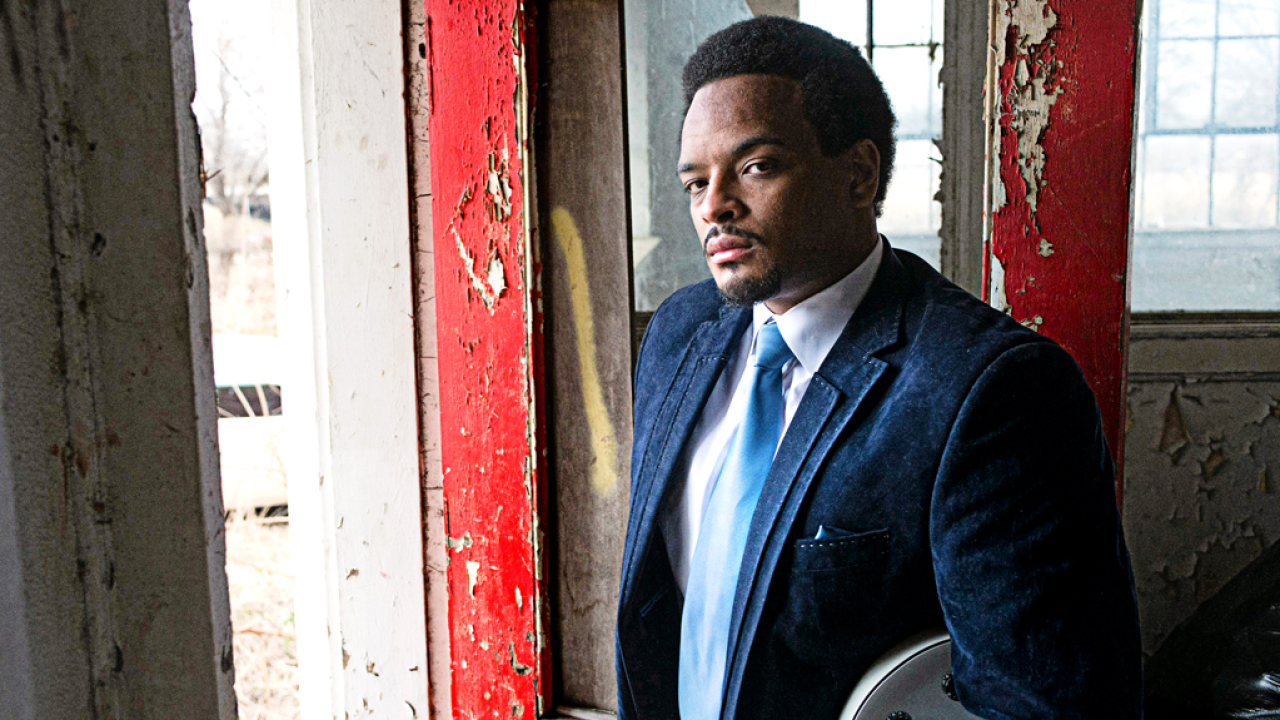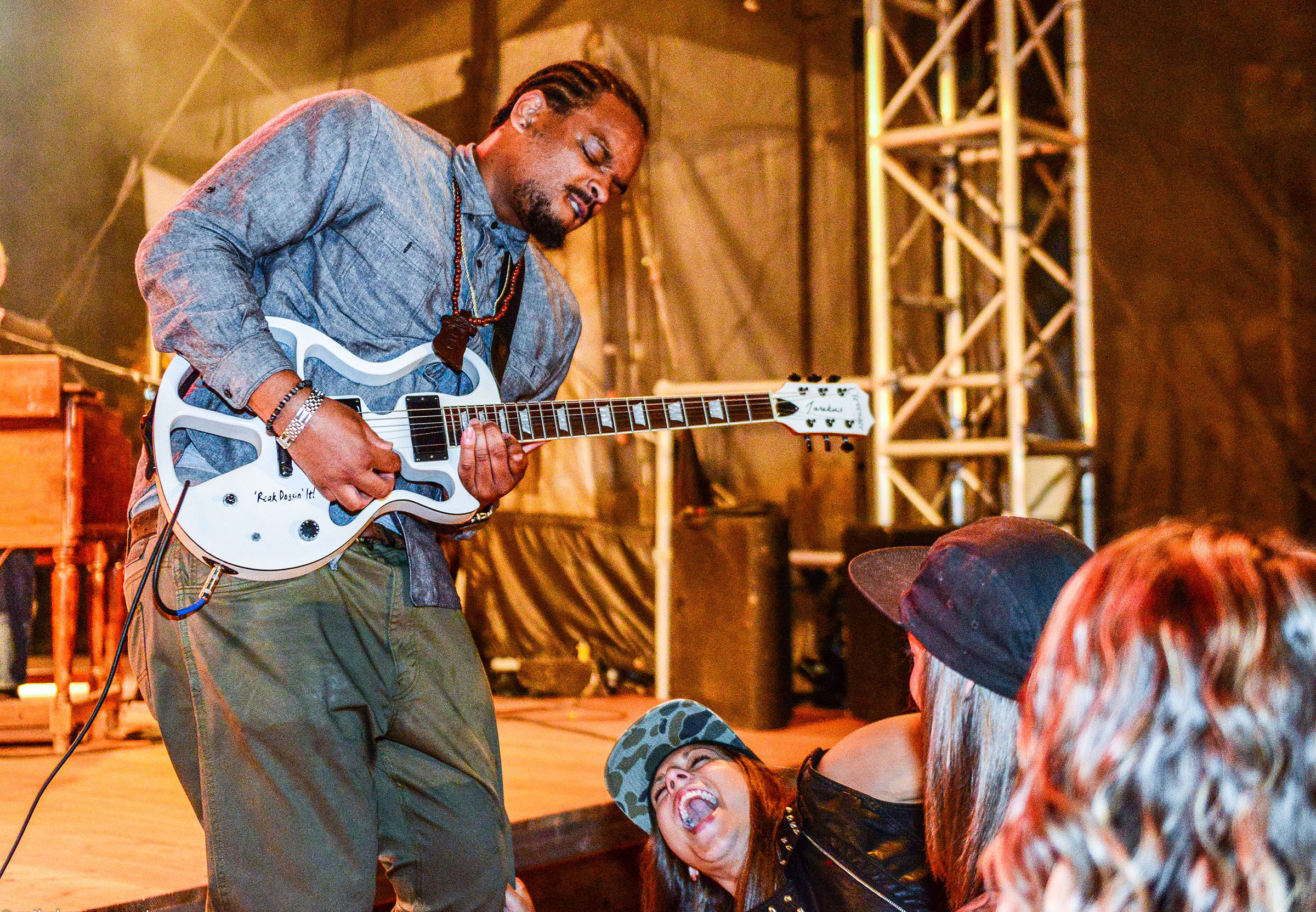Jarekus Singleton: Slam-Dunking The Blues
Former basketball prodigy Jarekus Singleton was all set for NBA stardom until an injury wrecked his dreams. Then the blues came calling.

In the blink of an eye, every plan and dream you have can be snatched away. No one understands that better than Jarekus Singleton. In college the Mississippi-born bluesman was a top-seeded basketball star, winner of National Player Of The Year, surely destined for fame in the NBA, until an ankle injury ended his career.
“My uncle was training me when I was nine or ten years old. He played me one-on-one like I was a grown man,” says Singleton. “Now, every time basketball season comes around I start getting jittery. My body is used to waking up in the morning and running and jumping and shooting and practising.”
When hard luck came knocking, Singleton followed the time-honoured tradition of taking his troubles and turning them into the blues. Inspired by the three Kings – Albert, BB and Freddie – and Texas legend Stevie Ray Vaughan, Singleton’s second album, Refuse To Lose, blends classic blues influences with a little funk, a lot of soul and the quick-witted lyricism of rap. Singleton may be a late starter – he’s 30 – but it sounds like he was born to it. It’s all about the attitude.
“When I was trying to go to the NBA I was calling all these different agents,” he says in a voice that exudes laid-back southern charm. “One guy said: ‘Man, you’ve got to crawl before you can walk.’ I said: ‘I know what you’re saying, but I don’t even remember crawling, all I remember is walking.’”
Singleton’s musical education began at the age of nine, when his uncle Tony taught him to play bass in his grandfather’s church band in Clinton, Mississippi. In his teens he switched to guitar, but his pastor grandfather was implacably opposed to secular music.
“Man, that guy was intense,” he says. “That’s how my momma grew up – she wasn’t allowed to wear pants, she wasn’t allowed to go to movies, wasn’t allowed to go to the prom. So she never withheld those things from me. I love my momma for that. But my granddaddy was doing what he thought was best. This dude was church, church, church. Me playing blues, that was the worst thing you could possibly do growing up in church.”
Despite granddaddy’s disapproval, uncle Tony broadened the youngster’s musical palette when Singleton was his personal chauffeur – even though he was too young to have a driving licence. “I would drive him around when I was eleven, twelve years old,” he says. “I thought I was the big shot because I was eleven and I’m driving around the neighbourhood so the girls could see me.”
Sign up below to get the latest from Classic Rock, plus exclusive special offers, direct to your inbox!

Uncle Tony’s music was the soundtrack to the young Jarekus’s life: 70s funk, old-time gospel, 90s R&B and hip-hop. Long before he turned his hand to the blues, Singleton rapped with his friends in high school.
“I still listen to rap, to hip-hop to this day,” he says. “When I was rapping it was about getting what was inside of me out of me. A lot of times when I was growing up I felt like I didn’t have a voice, because you always have somebody telling you what to do and how to live and what not to say. That’s just the way it was. I’m not down on it at all, because grandparents, parents, they do what they feel is the best at the time. I have a lot of respect for that. But I still felt like I had a lot to say. I was getting it out of my system. I was making CDs and giving them away because I wanted people to hear me. I wanted your ear.”
While the rap influence survives in Singleton’s smooth, flowing vocal style, the direction of his life changed completely after uncle Tony took him to a blues club. That night he found what he’d been searching for.
“Playing those slow blues and getting that guitar solo in, I never had that feeling before,” he says. “I never felt like I got everything out of me. And I didn’t have to say nothing. It didn’t have nothing to do with no crowd reaction, none of that. When I first started I was playing in front of nobody; you got two or three people in the building, we felt like we had something.”
When Singleton entered the International Blues Challenge in January 2010, he was not only going against his granddaddy’s preaching, but also against doctor’s orders too. He’d had surgery on his ankle the previous November.
“It was two days after I just got off crutches,” he says proudly, “and I was supposed to take it slow. But, man, I’m already hurt, you can’t get no worse than this. Even when I was on crutches and I had my cast on, I would play with other bands sitting in a chair.”
This kind of fearlessness defines Singleton’s career, from self-releasing his first blues album, Heartfelt, in 2011, to jumping into the International Blues Challenge with only two original songs under his belt.
“I had no idea what I was doing but I didn’t want to go there empty-handed,” he says of the latter. “If I have something in my heart to do and it’s an opportunity, and I don’t take it because I’m trying to babysit my creativity? No, I’ve just got to accelerate my maturity at that point.”
Jarekus Singleton is still driven by the hunger that fired him on the basketball court as a teenager. ‘I suffered so many years/I cried so many tears,’ he sings on the title track from Refuse To Lose. He’s not going to be the NBA star he dreamed of being as a teenager, but no one is going to take away his music.
“I was determined because basketball was taken away from me and I gave it everything I had,” he says. “Ain’t no pain like that. Before I leave this blues world I’m going to give it everything I have until I’m dead and gone.”
FUTURE BLUES
**Five other artists nailing the blues in 2015. **
Gary Clark Jr
**Who: **Austin hotshot who built his reputation on the Texas circuit before breaking through with his 2012 major-label debut, Blak And Blu.
The USP: This is blues-plus, with Clark incorporating soul and R&B into his music.
**Listen: **Live (Warner Bros, 2014)
Eric Gales
Who: One-time pre-teen guitar prodigy from Memphis whose left-handed playing has drawn comparisons to Hendrix.
The USP: There’s more hard rock in Gales’s sound than in most bluesers’, but his fretboard skills justify the Hendrix references.
Listen: Good For Sumthin’ (Cleopatra, 2014)
Samantha Fish
Who: One third of the Girls With Guitars trio-turned-solo artist, who won her first Blues Music Award in 2012.
The USP: She’s just at home blasting through War Pigs as laying down a burning blues.
Listen: Black Wind Howlin’ (Ruf, 2013)
Selwyn Birchwood
Who: Florida-born upstart who followed Singleton by winning the prestigious International Blues Challenge in 2013.
The USP: There’s boogie and a dash of funk in Birchwood’s blues. And that guitar can soar.
Listen: Don’t Call No Ambulance (Alligator, 2014)
Damon Fowler
Who: Florida multi-instrumentalist whose debut album, Riverview Drive, was produced by Rick Derringer.
The USP: He chucks swamp music, blues, country and Americana into a blender.
Listen: Sounds Of Home (Blind Pig, 2014)
After starting his writing career covering the unforgiving world of MMA, David moved into music journalism at Rhythm magazine, interviewing legends of the drum kit including Ginger Baker and Neil Peart. A regular contributor to Prog, he’s written for Metal Hammer, The Blues, Country Music Magazine and more. The author of Chasing Dragons: An Introduction To The Martial Arts Film, David shares his thoughts on kung fu movies in essays and videos for 88 Films, Arrow Films, and Eureka Entertainment. He firmly believes Steely Dan’s Reelin’ In The Years is the tuniest tune ever tuned.

